- Home
- Peter Swanson
The Kind Worth Killing Page 2
The Kind Worth Killing Read online
Page 2
When I could see the house looming above the scarred land, it struck me, not for the first time, how the rear side—the side that faced the ocean—was stylistically opposite from the side that faced the road. The front of the house had a stone veneer with a smattering of small windows and a towering set of dark wood doors with exaggerated arches. The rear of the house was beige-painted wood, and all the identical windows with their identical balconies made it look like a medium-size hotel. “I have a lot of friends,” Miranda had said when I asked her why the house needed seven guest bedrooms. Then she’d shot me a look as though I’d asked her why she thought indoor plumbing was necessary.
I found a good spot under a stunted spruce that was bent and twisted like a bonsai tree. I lay down on the damp ground on my front, and fiddled with the binoculars till I started to get the house in focus. I was about fifty yards away and could easily see through windows. I swept along the first floor, not spotting any movement, then worked my way across the second floor. Nothing. I took a break, surveying the house with my naked eye, wishing I had a view of the front driveway. For all I knew, there was nobody at the house at all, even though Daggett’s truck had still been there when I dropped Miranda off.
A few years earlier I’d gone out fishing with a colleague, a fellow dot-com speculator who was the best open water fisherman I’d ever known. He could stare out at the surface of the ocean and know exactly where the fish were. He told me that his trick was to unfocus his eyes, to take in everything in his visual range all at once, and by doing that he could catch flickers of movement, disturbances in the water. I tried it at the time, and only succeeded in giving myself a dull headache. So after completing another sweep with my binoculars, and seeing nothing, I decided to use this same trick on my own house. I let everything sort of blur in front of my eyes, waiting for any motion to draw attention to itself, and after I’d been staring at the house for less than a minute I caught some movement through the high window of what was to be the living room on the north edge of the house. I lifted my binoculars and focused on the window; Brad and Miranda had just entered. I could see them pretty clearly; the lowering afternoon sun was hitting the window at a good angle, lighting up the interior without causing a glare. I watched Brad walk over to a makeshift table that had been set up by the carpentry crew. He picked up a piece of wood that looked like a section of ceiling molding and held it out for my wife to see. He ran a finger down one of its grooves and she did the same thing. His lips were moving and Miranda was nodding at whatever he was saying.
For one brief moment I felt ridiculous, a paranoid husband dressed up in camouflage and spying on his wife and his contractor, but after Brad put the molding down I watched as Miranda slid into his arms, tilted her head back, and kissed him on the mouth. With one big hand he reached down and pressed her hips against him, and with his other he grabbed a handful of her unkempt hair. I told myself to stop watching but somehow I couldn’t. I watched for at least ten minutes, watched as Brad bent my wife over the table, lifted her dark purple skirt, removed a pair of tiny white underpants, and entered her from behind. I watched Miranda position herself strategically along the table, one hand braced on its edge, the other between her own legs, guiding him inside of her. They had clearly done this before.
I slid backward and into a sitting position. When I regained the path I pulled my hood back and threw up my lunch into a dark, wind-ruffled puddle.
“How long ago was this?” asked my fellow traveler after I’d told her the story.
“Just over a week.”
She blinked her eyes, and bit at her lower lip. Her eyelids were pale as tissue paper.
“So what are you going to do about it?” she asked.
It was the question I’d been asking myself all week. “What I really want to do is to kill her.” I smiled with my gin-numbed mouth and attempted a little wink just to give her an opportunity to not believe me, but her face stayed serious. She lifted her reddish eyebrows.
“I think you should,” she said, and I waited for some indication that she was joking, but nothing came. Her stare was unwavering. Staring back, I realized she was so much more beautiful than I had originally thought. It was an ethereal beauty, timeless, as though she were the subject of a Renaissance painting. So different from my wife, who looked like she belonged on the cover of a pulp novel from the 1950s. I was about to finally speak when she cocked her head to listen to the muffled loudspeaker. They’d just announced that they were boarding our flight.
CHAPTER 2
LILY
The summer I turned fourteen my mother invited a painter named Chet to come and stay with us. I don’t remember his last name; don’t know, in fact, if I ever knew it. He came and stayed in the small apartment above my mother’s studio. He had thick glasses in dark frames, a bushy beard that was always flecked with paint, and he smelled like overripe fruit. I remember the way his eyes darted down toward my chest when we were introduced. The summer was already hot and I was wearing cutoff jeans and a tank top. My breasts were no bigger than mosquito bites but he looked anyway.
“Hi Lily,” he said. “Call me Uncle Chet.”
“Why? Are you my uncle?”
He released my hand and laughed, a sputtering noise like an engine dying. “Hey, I already feel like family here, the way your parents are treating me. A whole summer to paint, man. Unbelievable.”
I walked away without saying anything.
He wasn’t the only houseguest that summer. In fact, there was never only one guest at Monk’s House, especially in summertime, when my parents’ teaching duties died down and they could focus on what they truly loved—drinking and adultery. I don’t say that in order to make some sort of tragedy of my childhood. I say it because it’s the truth. And that summer, the summer of Chet, there was a rotating cast of hangers-on, graduate students, ex-lovers, and current lovers, all coming and going like moths to a flickering porch light. And these were just the houseguests. My parents, as always, had endless parties—I would listen to these parties hum and roar through the walls of my bedroom as I lay in bed. They were familiar symphonies, beginning with bursts of laughter, discordant jazz, and the slap of screen doors, and ending, in the early morning hours, with the sound of yelling, sometimes sobbing, and always the slam of bedroom doors.
Chet was a slightly different breed of animal from the usual houseguest. My mother referred to him as an outsider artist, meaning, I suppose, that he was not affiliated with her college, neither a student nor a visiting artist. I remember my father calling him “the homeless degenerate your mother has housed for the summer. Avoid him, Lily, I think he has leprosy. And God knows what’s in the beard.” I don’t think it was genuine advice from my father—my mother was in earshot, and he was speaking for her benefit—but it turned out to be prophetic.
I’d spent my entire life at Monk’s House, my father’s name for the sprawling, rotting hundred-year-old Victorian mansion an hour from New York City in the deep woods of Connecticut. David Kintner—my father—was an English novelist who’d made most of his money off the film adaptation of his first and most successful book, a boarding-school sex farce that caused a brief sensation in the late 1960s. He’d come to America as a visiting writer at Shepaug University, and stayed on as an adjunct when he met Sharon Henderson, my mother, an abstract expressionist with a tenured teaching position in the school’s art department. Together, they bought Monk’s. It didn’t have a name when they purchased it, the year I was conceived, but my father, who rationalized the six bedrooms by plans to fill it with creative and intelligent (and young and female) houseguests, thought he’d like to name it after the house that Virginia and Leonard Woolf shared. It was also a reference to Thelonious Monk, my father’s favorite musician.
There were many peculiarities to Monk’s, including some unused solar panels that were smothered in ivy, a screening room with an old film projector, a wine cellar with a dirt floor, and a small kidney-shaped swimming pool in the backyard tha
t was rarely cleaned. Over the years it had devolved back into a murky pond, its bottom and sides covered in algae, its surface constantly filmed in rotting leaves, its unused filter clogged with the bloated corpses of mice and squirrels. At the beginning of that particular summer, I had made an attempt to clean the half-filled pool myself, pulling off the mold-blackened tarp, finding a butterfly net that worked for skimming the leaves, then filling the pool from the hose over the course of one tepid June day. I asked my parents separately if they would pick up pool chemicals the next time they went shopping. My mother’s response: “I don’t want my darling daughter swimming around in a bunch of chemicals all summer.” My father promised to make a special trip to the store, but I watched the memory of the promise fade out of his eyes before we even finished the conversation.
I swam in the pool, anyway, for the first half of the summer, telling myself that at least I had it to myself. The water turned green, and the bottom and sides became slippery with dark algae. I pretended the pool really was a pond, deep in the woods, in a special place that only I knew about, and my friends were the turtles and the fish and the dragonflies. I swam at dusk, when the cricket whine was at its highest, nearly blocking out the sounds of parties starting up on the screened porch at the front of the house. It was on one of those dusk swims that I first noticed Chet, a beer bottle in his hand, watching me from the edge of the woods. “How’s the water?” he asked, when he realized he’d been spotted.
“It’s all right,” I said.
“I didn’t even know this pool was back here.” He stepped out of the woods and into the remaining light of the day. He wore a pair of white overalls that were spattered in paint. He sipped at his beer, foam clinging to his beard.
“No one uses it but me. My parents don’t like to swim.” I paddled in the deep end, glad that the water was green and cloudy, so that he couldn’t see me in my bathing suit.
“Maybe I’ll go swimming sometime. Would that be all right with you?”
“I don’t care. You can do what you want.”
He finished his beer in one long pull, making a popping sound when he pulled it away from his lips. “Man, what I really want is to paint this pool. And maybe you’d let me paint you in it. Would you let me do that?”
“I don’t know,” I said. “What do you mean?”
He laughed. “Just like this, you in the pool, in this light. I would like to create a painting. I mostly do abstracts, but for this . . .” He trailed off, scratched at the inside of his thigh. After a pause, he asked, “Do you know how goddamn beautiful you are?”
“No.”
“You are. You’re a beautiful girl. I’m not supposed to say that to you because you’re young, but I’m a painter so it’s okay. I understand beauty, or at least I pretend to.” He laughed. “You’ll think about it?”
“I don’t know how much more swimming I’ll do. The water is kind of dirty.”
“Okay.” He looked into the woods behind me, slowly bobbing his head. “I need another beer. Can I get you something?” He was now holding the empty bottle upside down by his side, drips of beer falling onto the unmown grass. “I’ll get you a beer if you want one.”
“I don’t drink beer. I’m only thirteen.”
“Okay,” he said, and stood watching me for a while, waiting to see if I would get out of the water. His mouth hung open slightly, and he scratched again at the inside of his thigh. I stayed put, treading water, and spun so that I wasn’t facing him.
“Ophelia,” he said, almost to himself. Then, “Okay. Another beer.”
When he left I got out of the pool, knowing that I was done swimming for the summer, and hating Chet for wrecking my secret pond. I wrapped myself in the large beach towel I’d brought to the pool and ran through the house toward the bathroom nearest my room on the second floor. My chest hurt, as though the anger inside of me was a balloon, slowly inflating but never going to pop. In the bathroom with the rattling vent turned on and the shower going, I screamed repeatedly, using the nastiest words I knew. I was screaming because I was mad, but I was also screaming to keep myself from crying. It didn’t work. I sat on the tiled floor, and cried until my throat hurt. I was thinking of Chet—the scary way he looked at me—but I was also thinking of my parents. Why did they fill our home with strangers? Why did they only know sex maniacs? After showering, I went into my bedroom and looked at myself naked in the full-length mirror on the inside of my closet door. I’d known about sex for almost my entire life. One of my earliest memories was of my parents doing it on a large towel in the dunes on some beach vacation. I was three feet away, digging in the sand with a plastic trowel. I remember that my baby bottle was filled with warm apple juice.
I turned and looked at my body from all sides, disgusted by the patch of red hair sprouting between my legs. At least my breasts were barely noticeable, unlike my friend Gina who lived down the road. I pulled my shoulders back and my breasts completely flattened out. If I held a hand between my legs I looked the same as I had when I was ten years old. Skinny, with red hair, and freckles that darkened my arms and the base of my neck.
I dressed in jeans and a sweatshirt, even though the night was still sweltering hot, and went downstairs to make myself a peanut butter sandwich.
I stopped swimming in the pool. I don’t know if Chet continued to look for me there. I would see him sometimes on the top step that led to the apartment above my mother’s studio, smoking a cigarette and gazing toward the house. And he was occasionally in our kitchen, speaking with my mother, usually about art. His eyes would find me, then slide away, then find me again.
My father took off that summer for about three weeks. It happened immediately after a visit from several of his English friends, including a young poet named Rose. He introduced us by saying, “Rose, meet Lily. Lily, meet Rose. Do not compete. You are both beautiful flowers.” Rose, skinny and with large breasts, smelled of clove cigarettes, and when she shook my hand she stared at the top of my head. I was worried that after my father disappeared Chet would show up in the house more often. Instead, another man showed up, with a Russian name. I liked him, but only because he had a beautiful shorthaired mutt named Gorky. We hadn’t had any animals at the house since Bess, my cat, had died three months earlier. With the Russian around, Chet disappeared from view for a while, and I was beginning to feel safe. Then Chet came to my bedroom late on a Saturday night.
I knew it was a Saturday because it was the night of the important party, one that my mother had been talking about for over a week. “Lily, darling, take a bath on Saturday because of the party.” “Lily, you’ll help your mother make the spanakopita for our party, won’t you? I’ll let you hand them out the way you like.” It was strange that she cared about this particular night. She had parties all the time, but usually with teachers and students from the college. For this party, people were coming from New York to meet the Russian. My father was still gone, and my mother was nervous, her short hair sticking out at the back because of how often she ran her fingers through it. I stayed away from the house for most of that Saturday, walking through the stretch of pine trees to my favorite place, a meadow edged with stone walls that abutted a long-abandoned farmhouse. I threw rocks at trees until my arm began to ache, then lay back for a while on the soft hummock of grass near the willow. I daydreamed of my other family, the imaginary one with boring parents, and seven siblings, four boys and three girls. The day was hot. I could taste salty sweat on my upper lip, and as I lay there, I watched dark, swollen clouds build in the sky. When I heard the first low rumble of thunder, I stood, brushed grass from the back of my legs, and returned to the house.
The thunderstorm pelted Monk’s for a dark hour. My mother drank gin and pulled things from the oven, telling the Russian how perfect the storm was—how she couldn’t ask for a better sound track to her party—although I could tell she was upset. When guests began to arrive the skies were blue again, the only evidence of the storm the cleanness of the air, and t
he steady dripping from the swollen gutters. I passed appetizers to people I’d never seen before, then snuck away to my room, bringing two cold Pop-Tarts with me for my dinner.
I ate in my room, and tried to read. I had taken a paperback from my mother’s stack of books by her side of the bed. It was called Damage, by Josephine Hart, and I’d heard her talking about how she didn’t like it, how it was just trash dressed up as something literary. It made me want to read it, but I didn’t really like it either. It was about an Englishman, like my father, who was having sex with his son’s girlfriend. I hated everyone in it. I gave up and pulled a Nancy Drew from my shelf. Number ten: The Password to Larkspur Lane. I knew I was too old to be reading Nancy Drew but it was by far my favorite. I fell asleep while reading it.
I woke to the sound of my bedroom door being opened. Light fell in from the hallway and I could hear loud rock music coming from downstairs. I was curled on my side, a single sheet pulled up to my waist, facing the door. I cracked open my eyes and could see Chet standing in the doorframe. The light was coming from behind him, but he was easy to identify because of the beard, and the dark-framed glasses, an edge of which had caught the yellow light from the hall. He swayed a little, like a tree in a strong wind. I didn’t move, in the hopes that he would go away. Maybe I wasn’t who he was looking for, even though I knew I was. I considered screaming, or trying to run from the room, but there was a steady thump of bass and drum throughout the house and I didn’t think anyone would hear me. And then Chet would kill me for sure. So I closed my eyes, hoping he would go away, and with my eyes closed, I heard him step into the room, quietly shut the door behind him.

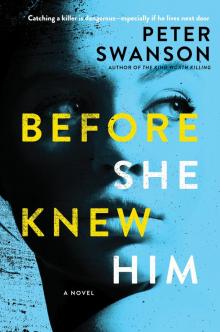 Before She Knew Him
Before She Knew Him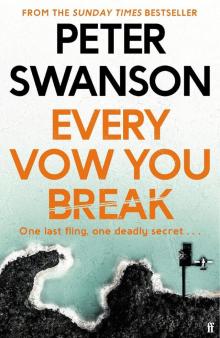 Every Vow You Break
Every Vow You Break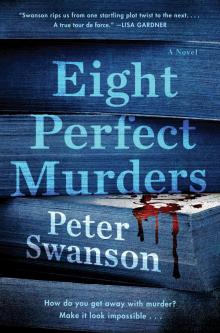 Eight Perfect Murders
Eight Perfect Murders Rules for Perfect Murders
Rules for Perfect Murders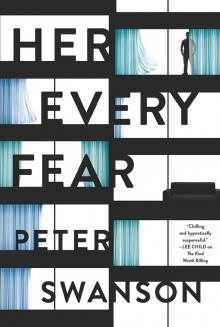 Her Every Fear
Her Every Fear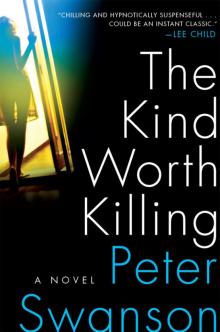 The Kind Worth Killing
The Kind Worth Killing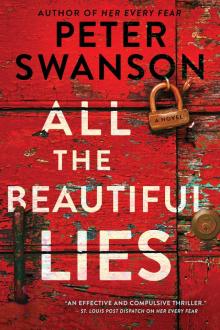 All the Beautiful Lies
All the Beautiful Lies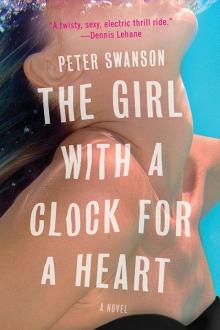 The Girl with a Clock for a Heart: A Novel
The Girl with a Clock for a Heart: A Novel